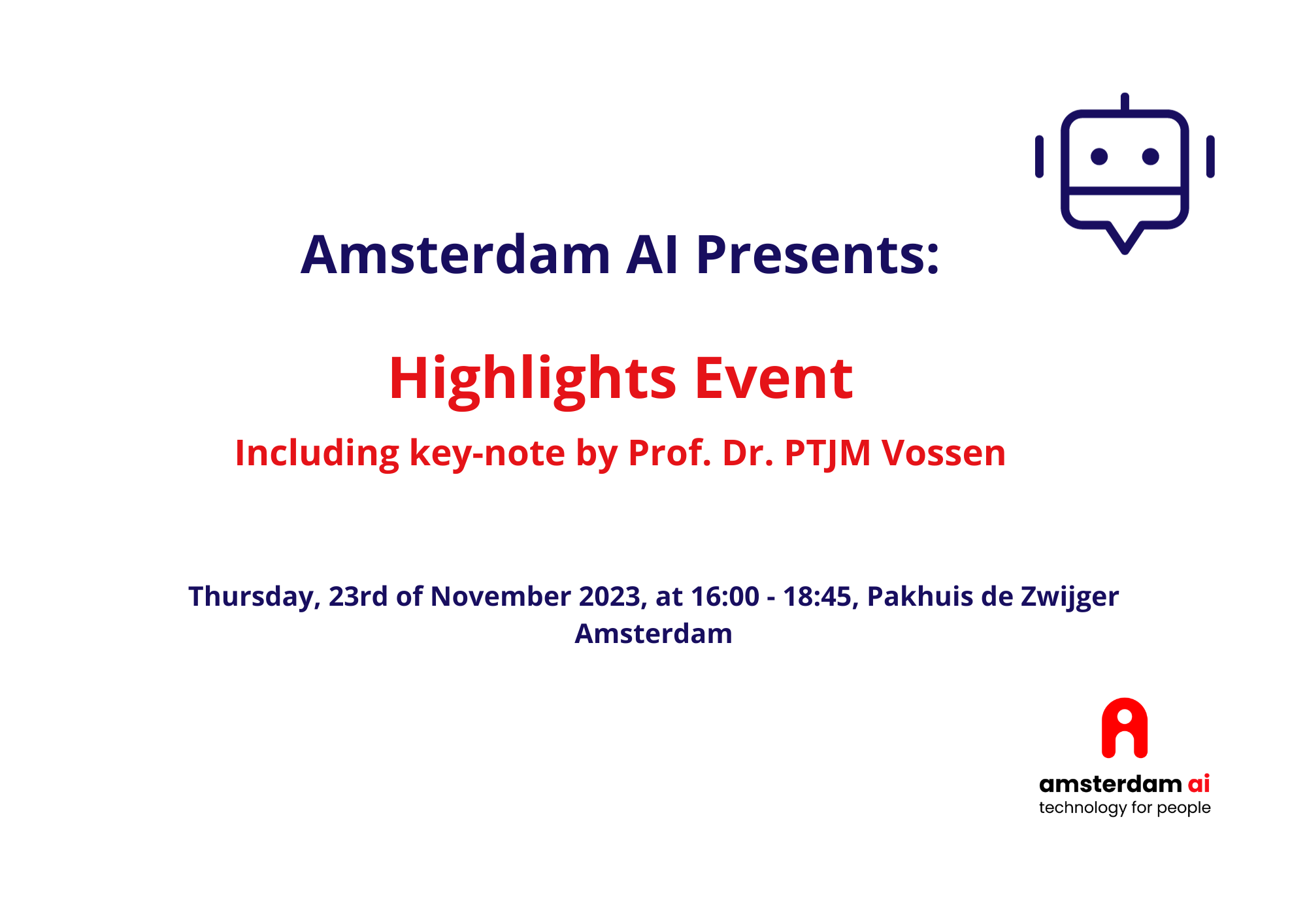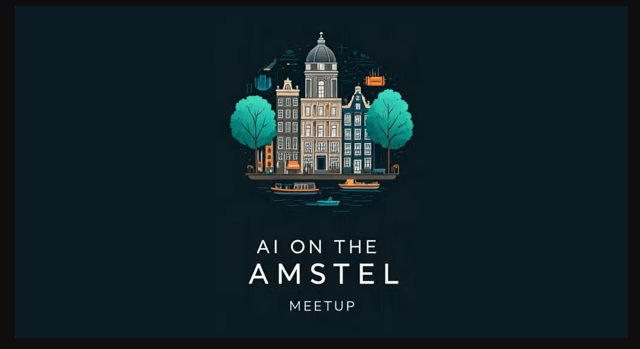< Terug naar evenementen 




23
November
2023
November
2023
Amsterdam AI Highlights Event
Amsterdam AI organiseert op donderdag 23 november haar jaarlijkse Highlights Event in Pakhuis de Zwijger! Het evenement zal ook hoogtepunten bevatten van onze academische en industriële partners en de winnaars van de vierde ADS Thesis Awards.
Haal je ticket door te klikken op de knop beneden!
Programma
16:15 Welcome
16:30 Introduction
16:40 Keynote Speaker
17:15 Q&A
17:25 Amsterdam AI Thesis Awards
17:40 Closing Remarks
17:45 Drinks
16:30 Introduction
16:40 Keynote Speaker
17:15 Q&A
17:25 Amsterdam AI Thesis Awards
17:40 Closing Remarks
17:45 Drinks
Piek Vossen
Title: Meaning in a cross-lingual language model
Large Language Models or LLMs have two major components: the vocabulary and the attention model. The vocabulary is derived from the training data by tokenising the textual input and inferring what tokens are most frequent. Vocabularies are limited in size, which necessarily means that words that represent concepts are broken down into smaller parts. If that happens a word looses meaning or gets misrepresented in the model. Wen the model is initialised, the meaning needs to be repaired using the context. For example, my name is not in the vocabulary of an English model and will be broken down into “pie” and “k” and similarly the two where I live “weesp” is broken down in “we” and “esp". Obviously, these tokens obtained very different meanings so the model wil be off after initialisation with my name and my town. Still models can recover that “pie”, “k”, “we” and “esp" actually represent the name of a person and a town in e.g. “My name is Piek and I live in Weesp” but only because the context is clear. This raises the question what happens in a cross-lingual language model in which up to a hundred languages need to share the vocabulary? These models can still transfer very well information from one language to another even though they share tokens with different meanings, such as the tokens “star” and “ster" in English and Dutch, or do not share any token at al, in case of languages with unique scripts. How can these models share associations and attention, how do they transfer conceptual relations, or impose linguistics structures. In this talk, I will present some of our research to answer these questions, which sheds light on the nature of these models as well.
Bio: Prof. Dr. P.Th.J.M. (Piek) Vossen (1960) is a full Professor of Computational Lexicology at the Vrije Universiteit Amsterdam, Head of the Computational Lexicology & Terminology Lab (CLTL), co-founder and co-president of the Global WordNet Association (GWA) and Dean of Research of the Board of the Faculty of Humanities of the Vrije Universiteit of Amsterdam). His research interests are WordNets, Computational Lexicon, Ontologies, Computational Linguistics, Language Technology and Computer-Applications, both within a single language and from a multilingual perspective. Vossen is interested in the relation between lexicons and ontologies, from a theoretical point of view as well as from their usage in computer-applications in which meaning and interpretation play a role. He sees the lexicon as a fundamental resource to anchor meaning and interpretation in useful computer behaviour. Computer behaviour can make use of communicative models and insights from communication science. The organization of the lexicon and the knowledge stored in it need to take that usage as a starting point. He combines linguistics and computer science to model understanding of natural language texts by computers.
In 2013 he won the prestigious Spinoza Award of the Netherlands Organisation for Scientific Research (NWO) and in 2015 he has been honoured by the Dutch Royal House as a “Knight in the Order of the Dutch Lion”. He is also a member of the Koninklijke Nederlandse Akademie van Wetenschappen (KNAW) in three domains and a member of the Koninklijke Hollandsche Maatschappij der Wetenschappen (KHMW).
The Amsterdam AI Thesis Awards
De Amsterdam AI Thesis Awards hebben als doel het bevorderen van excellentie in AI en Data Science van studenten op bachelor- en masterniveau van de in Amsterdam gevestigde Amsterdam-AI universiteitspartners (HvA, UvA en VU). De doelen van de Amsterdam AI Thesis Award zijn:
1. Belonen en bepleiten van kwalitatief hoogstaand scriptie werk;
2. Vrouwen en ondervertegenwoordigde minderheden stimuleren en aanmoedigen om hun opleiding voort te zetten;
3. Diversiteit in AI en Data Science aanmoedigen;
4. Amsterdam en het Amsterdamse AI-ecosysteem promoten als innovatie hub door excellente scripties onder de aandacht te brengen.
1. Belonen en bepleiten van kwalitatief hoogstaand scriptie werk;
2. Vrouwen en ondervertegenwoordigde minderheden stimuleren en aanmoedigen om hun opleiding voort te zetten;
3. Diversiteit in AI en Data Science aanmoedigen;
4. Amsterdam en het Amsterdamse AI-ecosysteem promoten als innovatie hub door excellente scripties onder de aandacht te brengen.
De winnaars zullen hun scriptie werk presenteren tijdens het Highlights Event en hun prijs ontvangen.
Aankomend >
Aankomende evenementen

18 september 2025
AI on the Amstel x Amsterdam AI: Unpacking AGI hype vs. reality
AI on the Amstel and Amsterdam AI collaborate on a technical meetup that features knowledgeable executive-level speakers discussing "in the weeds" AI topics and challenges. Our speakers have first-hand experience building AI products and services - there will be no vague discussions about AI disruption!
Lees meer >

24 & 25 september
TechEx
Doe mee met TechEx en ontdek de nieuwste ontwikkelingen op het gebied van Generatieve AI, Enterprise AI, Machine Learning, Security, Ethische AI, Deep Learning, Data Ecosystemen en NLP. Haal je gratis of gold pass voor volledige toegang tot 8 gelijktijdige evenementen verspreid over 2 dagen.
Lees meer >

25 september
Conferentie Digitale Duurzaamheid
Wat is de impact van jouw digitale gedrag? Ontdek het op donderdag 25 september tijdens de conferentie Digitale Duurzaamheid op de HvA Amstelcampus.
Lees meer >